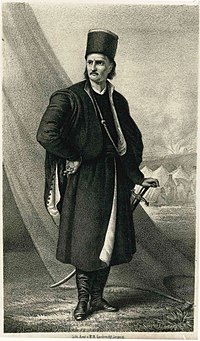Tudor Vladimirescu
| Tudor Vladimirescu Tudor din Vladimiri Domnul Tudor |
|
|---|---|

Portrait of Tudor Vladimirescu by Theodor Aman (painted after Tudor's death, it was allegedly based on the testimonials of his Pandurs)
|
|
| Born | c. 1780 Vladimiri, Gorj County (in the region of Oltenia) |
| Died |
7 June 1821 Târgovişte |
Tudor Vladimirescu (Romanian pronunciation: [ˈtudor vladimiˈresku]; c. 1780 – 7 June [O.S. 27 May] 1821) was a Romanian revolutionary hero, the leader of the Wallachian uprising of 1821 and of the Pandur militia. He is also known as Tudor din Vladimiri (Tudor of Vladimiri) or — occasionally — as Domnul Tudor (Voivode Tudor).
Tudor was born in Vladimiri, Gorj County (in the region of Oltenia) in a family of landed peasants (mazili); his birth year is usually given as 1780, but this is still debated. At the age of 12, he was sent to Craiova, in service to boyar Ioan Glogoveanu, where he would later learn rhetoric, grammar and the Greek language. He became administrator of the boyar's estate and, in 1806, was named vătaf (leader of the local militias) at Cloșani. Tudor's experience as a servant made him familiar with customs, habits and objectives of landowners; this insight helped him walk the fine line between conflicting interests of boyars and peasants in the first months of the uprising against the Phanariotes. While leader of a mainly peasant movement, Tudor did his best not to antagonize the elite, punishing any destruction of property.
Tudor enrolled in the Russian army and took part in the Russo-Turkish War, 1806-1812. Consequently, he was awarded the Order of St. Vladimir 3rd degree and given Russian protection and immunity from prosecution under both Wallachian and Ottoman legislation (see Sudiți). This contributed to Tudor's decisions throughout the uprising, alongside his belief that Russia was backing his actions. After the war, Tudor returned to Oltenia. He traveled briefly to Vienna, in 1814, in order to attend a lawsuit involving Glogoveanu's wife's patrimony. The trip coincided with the Peace Congress, and it is believed that Vladimirescu followed the treaties' outcome.
...
Wikipedia
